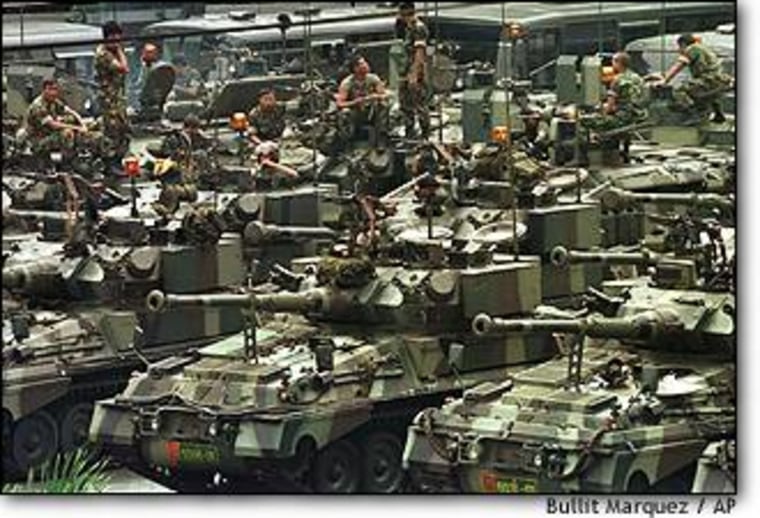Just one day after riots wracked Jakarta, leaving hundreds dead, and buildings smoldering around the perimeter of the city, the pilot had this to say to the handful passengers arriving aboard flight CX777 from Hong Kong: “Ladies and Gentlemen. We are 30 minutes from landing in Jakarta. The weather is fine and the temperature is 30 degrees… Conditions are good for landing. We thank you for flying Cathay.” Nothing more.
The airline, like the Indonesian government, seemed eager to maintain a veneer of normalcy. After all, traffic is picking up again, spewing familiar diesel fumes into the leaden tropical air, replacing the smoke that blanketed the city. Though most shops remain closed, prostitutes have begun plying the streets, and many of the journalists who jetted in to cover the mayhem have gravitated to hotel bars for a stiff one.
But you don’t have to look far to learn that few believe the peace will last.
“Do not be fooled by calm,” I was warned by an Indonesian American who is based in the city. “Crowds gather incredibly fast, here and the crowds have been incredibly vicious.”
The general sense is that with the return of President Suharto, the battleground has shifted to the closed halls of Indonesian power-and is being played out among a tiny club of military brass, and the First Family.
Suharto has promised that the government will investigate and punish those who killed six student protesters on Tuesday — the incident that set off wider protests. Suharto also lowered prices on fuel and electricity. It was the government’s decision to lift subsidies on fuel and electricity prices that sparked violent riots, looting and burning in Jakarta and other cities across the archipelago. And today, Suharto also promised to reshuffle his cabinet, presumably to pacify critics who note that he’s filled his administration with his wealthy cronies.
But the justifiable anger of Indonesians has been unleashed-as evidenced in the blunt calls for Suharto’s resignation. So, too, has the fierce and senseless wrath of the mob. For not only crowds attack the banks, businesses and homes of Chinese Indonesians-perceived to have a stranglehold on the economy, but they torched shopping malls—killing hundreds of their own number who were trying to loot the shops.
A heavy-handed show of military force has certainly brought a greater sense of order in the last 48 hours, but it has not offered Indonesian people a greater sense of control over their destiny. Indeed, Suharto has now firmly denied that he suggested-as reported in recent days-that he would give up power if the people no longer trust him.
Theories abound
But trust has disappeared. In an information void, everyone now has a theory about what is happening behind closed doors. Some believe that the government infiltrated the crowds of protesters to provoke violence, and make way for a crackdown. Others say Suharto is using the chaos to show the International Monetary Fund that its severe conditions for lending to Indonesia could not be imposed. Some think he’s buying time, and others think his family has fled to Brunei.
Optimists think that the military will orchestrate a takeover of the government, bringing a more equitable leader to the fore, and stability to the economy. “No one knows,” said an indigenous Indonesian who was returning from an Amway distributors conference in the U.S. “Just like no one knew when Suharto came in,” replacing then President Sukarno in the late 1960s.
Sigh of relief
For now, the city has a reprieve. Student protesters are home for the weekend. The looters have retreated with their booty, perhaps somewhat chastened by the scope of their destruction. Some of the Chinese Indonesians who moved to downtown hotels for safety have begun filtering back to their neighborhoods. And tanks that roared through streets this week are now tucked away along side streets, nearly out of sight.
On the flight from Hong Kong, which carried just 44 passengers, there were a few dozen Chinese who felt it was safe enough for now to rejoin their families and check on their property. “I was going crazy in Hong Kong not knowing what was going on,” says a young Chinese Indonesian woman who works for Dow Chemical.
But the coming days will be telling. One of the country’s most prominent Muslim leaders, Amien Rais, has called for a nationwide protest on May 20th — a day in Indonesian history likened to the Boston Tea Party-when Indonesians asserted their nationalism. If the government doesn’t come up with sweeping reforms by then-possibly even the ouster of the President-to assuage some of the anger that it has unleashed, many fear even worse is yet to come. The United States embassy is telling citizens who remain in Jakarta to leave before the 20th rolls around. “Should the president resign?” I asked an indigenous Indonesian man. “Yes,” he said. “If there is to be peace.”
MSNBC’s Kari Huus is covering the unrest in Indonesia.
